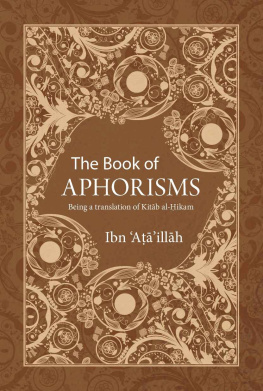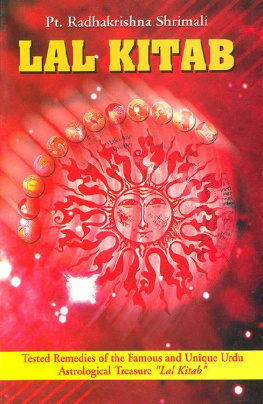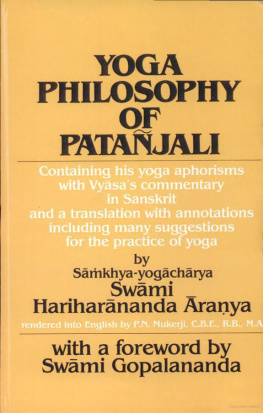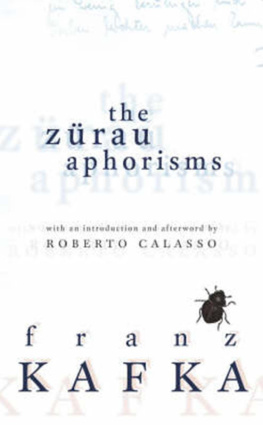Ibn ‘Ata’illah al-Iskandari - The Book of Aphorisms: Being a translation of Kitab al-Hikam
Here you can read online Ibn ‘Ata’illah al-Iskandari - The Book of Aphorisms: Being a translation of Kitab al-Hikam full text of the book (entire story) in english for free. Download pdf and epub, get meaning, cover and reviews about this ebook. year: 2015, publisher: Islamic Book Trust, genre: Children. Description of the work, (preface) as well as reviews are available. Best literature library LitArk.com created for fans of good reading and offers a wide selection of genres:
Romance novel
Science fiction
Adventure
Detective
Science
History
Home and family
Prose
Art
Politics
Computer
Non-fiction
Religion
Business
Children
Humor
Choose a favorite category and find really read worthwhile books. Enjoy immersion in the world of imagination, feel the emotions of the characters or learn something new for yourself, make an fascinating discovery.
- Book:The Book of Aphorisms: Being a translation of Kitab al-Hikam
- Author:
- Publisher:Islamic Book Trust
- Genre:
- Year:2015
- Rating:4 / 5
- Favourites:Add to favourites
- Your mark:
- 80
- 1
- 2
- 3
- 4
- 5
The Book of Aphorisms: Being a translation of Kitab al-Hikam: summary, description and annotation
We offer to read an annotation, description, summary or preface (depends on what the author of the book "The Book of Aphorisms: Being a translation of Kitab al-Hikam" wrote himself). If you haven't found the necessary information about the book — write in the comments, we will try to find it.
The Book of Aphorisms: Being a translation of Kitab al-Hikam — read online for free the complete book (whole text) full work
Below is the text of the book, divided by pages. System saving the place of the last page read, allows you to conveniently read the book "The Book of Aphorisms: Being a translation of Kitab al-Hikam" online for free, without having to search again every time where you left off. Put a bookmark, and you can go to the page where you finished reading at any time.
Font size:
Interval:
Bookmark:
The Book of Aphorisms
Being a translation of Kitb al-ikam
Ibn Aillh al-Iskandar
Translated by
Muhammed Nafih Wafy
Islamic Book Trust
Kuala Lumpur
Islamic Book Trust 2010
All rights reserved. No part of this publication may be produced, stored in a retrieval system, or transmitted, in any form or by any means, electronic, mechanical, photocopying, recording or otherwise without the prior permission of the publisher.
Published by
Islamic Book Trust
607 Mutiara Majestic
Jalan Othman
46000 Petaling Jaya
Selangor, Malaysia
www.ibtbooks.com
Islamic Book Trust is affiliated with The Other Press.
Contents
Introduction
Amad ibn Muammad ibn Aillh al-Iskandar was a great Sufi master and jurisprudence scholar who was born into a distinguished family of religious scholars in Alexandria in the thirteenth century (7 AH), when Egypt was ruled by Mamlks. He started his education as a disciple of Ab al-asan al-Abyr, a famous Mlik jurist, and studied under some of the best and most illustrious teachers of Alexandria at the time. He was well versed in all disciplines of traditional Islamic knowledge and became a distinguished Mlik scholar. Ibn Aillh was initially not drawn to Sufism in spite of his fathers attachment to the great Sufi Shaykh Ab al-asan al-Shdhil, the founder of the Shdhil Sufi order. After a stint as a teacher and preacher in Alexandria, he moved to Cairo where he taught jurisprudence, adth and Taawwuf at al-Azhar Mosque and Manriyyah madrasah as well as privately to his disciples. A large number of Islamic scholars of the time including the Shfi jurists Taq al-Dn al-Subk and Imam al-Qarf were his disciples.
It was his meeting with Ab al-Abbs al-Murs, the second Shaykh of Shdhil Sufi order, that precipitated a major shift in his life. Recalling his first conversation with al-Murs, he later said that the Shaykh had advised him on how to deal with the four states in a mans life: blessing, trial, obedience and disobedience. When he complained of some anxieties gnawing at him, the Shaykh advised him: If you are blessed, what Allah requires of you is thankfulness. If you are tried, what Allah requires of you is patience. If you are obedient, what Allah requires of you is your contemplating His blessings on you. If you are disobedient, then what Allah requires of you is your asking for forgiveness. After his first conversation with al-Murs, Ibn Aillh felt that his worries and grief were like a garment that had been taken off.
Then he became a devoted disciple of al-Murs. His association with the Shaykh for twelve years saw his development as a great Sufi master capable of guiding and teaching others. Besides a scholar of great erudition and undoubted originality, Ibn Aillh became an authority on both the Sufi path and Islamic Law.
He became widely respected and honoured in Cairo among all sections of people, including the high echelons of the ruling dynasty. His advice and suggestions were held in high regard by the Mamlk sultans. He was also influential in the Mamlk court, and used to counsel Sultan al-Manr on religious matters.
He wrote the first systematic treatise on dhikr, titled The Key to Salvation: A Sufi Manual of Invocation ( Mift al-Fal ). This was followed by his magnum opus, Kitb al-ikam (The Book of Aphorisms), and numerous other works aimed at guiding people on the right path to spiritual salvation.
The writing of ikam , arguably his most important work, marked his development as a Sufi master in his own right. Meanwhile, after the demise of al-Murs he was appointed as the great master of the Shdhiliyyah order, which expanded from Morocco and spread throughout North Africa and beyond.
His other important works are al-Qad al-Mujarrad f Marifah al-Ism al-Mufrad (The Pure Goal Concerning Knowledge of the Unique Name), Tj al-Ars al-w li Tahdhb al-Nufs (The Brides Crown Containing the Discipline of Souls), Unwn al-Tawfq f db al-arq (The Sign of Success Concerning the Discipline of the Path), Laif al-Minan f Manqib Ab al-Abbs al-Murs wa Shaykhih Ab al-asan (The Subtle Blessings of the Commendable Acts of Ab al-Abbs al-Murs and His Shaykh Ab al-asan al-Shdhil).
He influenced a great number of people, including scholars, rulers and laymen, who came to him for spiritual advice and solace. He straddled at ease the professional life as a teacher of Mlik jurisprudence in various public institutions and mosques in Cairo and his life as a spiritual master of the Shdhil order imparting spiritual light to hundreds of his disciples. He was the first to systematise the Shdhil orders doctrines and to record the biographies of its founder, Ab al-asan al-Shdhil, and his successor, Ab al-Abbs al-Murs.
Even his contemporary Ibn Taymiyyah, who cast aspersion on some of the Sufis at the time and had differences with Ibn Aillh on several issues, described him as a man of scrupulous piety, abundant learning, integrity and truthfulness in speech. During a historic debate between these two eminent scholars of the time at al-Azhar Mosque, Ibn Taymiyyah said, I bear witness that I have seen no one like you either in Egypt or in Syria who loves Allah more, is more self-effacing in Him and is more obedient in carrying out what He has commanded and in refraining from what He has forbidden. This complement from Ibn Taymiyyah is enough to prove the respect and admiration he earned from his contemporaries cutting across all divides.
Shaykh Ibn Aillh died at the age of 60 in November 1309 at al-Manriyyah madrasah . He was laid to rest at Qarfah Cemetery in Cairo after a funeral procession attended by a large number of people.
Kitb al-ikam is a slender mystic classic which enjoys a universal reputation as the jewel in the crown of Sufi literature. The book is a collection of 261 Sufi aphorisms (some counted it 264) containing precise, contemplative reflections on mans relations with his Creator. It is designed as a manual of spiritual development aimed at guiding and instructing spiritual aspirants and pursuers. Purely based on the teachings of the noble Quran and the sayings of Prophet Muammad ( ), the book provides training to fulfil the objectives of sublime servanthood in human life through developing a deep relation with the Almighty God.
It explains the way to live Islam both outwardly and inwardly and guides people towards the perfection of good character and spiritual realisation. Most of the aphorisms are written in a conversational format addressing a second person, obviously the spiritual aspirant.
The ikam was evidently dictated by the Shaykh to one of his disciples, who was none other than Taq al-Dn al-Subk, who later handed it over to Shdhil master Amad Zarrq.
As a unique and beautiful work written in a meditative language and inimitable style, ikam attracted universal Muslim approval from his own time up to the present day. A combination of profound spiritual teachings, real charm of language, forcefulness of expression and intensity of conviction makes ikam certainly the most appealing of Ibn Aillhs books to later generations of Muslims.
Over a period, ikam has been the object of numerous commentaries by eminent scholars. Some of the famous commentators are Shaykh Muammad ibn Ibrhm (Ibn Abbd al-Rund), Shaykh al-Islm Abdullh al-Sharqw, Shaykh Amad Zarrq, founder of the Zarrqiyyah Sufi order, and Amad ibn Ajbah. Most recently, a four-volume commentary of the ikam was written by modern scholar Muammad Sad Ramn al-B.
In the earlier chapters, the book delves into the profound meaning of monotheism and examines the subtlest ways of idolatry and polytheism that hinder ones true spiritual development. This is followed by aphorisms related to improving human character and achieving mental purification. The final part of the book deals with the obligations and requirements of a true spiritual journey.
Next pageFont size:
Interval:
Bookmark:
Similar books «The Book of Aphorisms: Being a translation of Kitab al-Hikam»
Look at similar books to The Book of Aphorisms: Being a translation of Kitab al-Hikam. We have selected literature similar in name and meaning in the hope of providing readers with more options to find new, interesting, not yet read works.
Discussion, reviews of the book The Book of Aphorisms: Being a translation of Kitab al-Hikam and just readers' own opinions. Leave your comments, write what you think about the work, its meaning or the main characters. Specify what exactly you liked and what you didn't like, and why you think so.


![an-Nawawi - The Book of Remembrances [Kitab al-Adhkar]](/uploads/posts/book/371945/thumbs/an-nawawi-the-book-of-remembrances-kitab.jpg)





